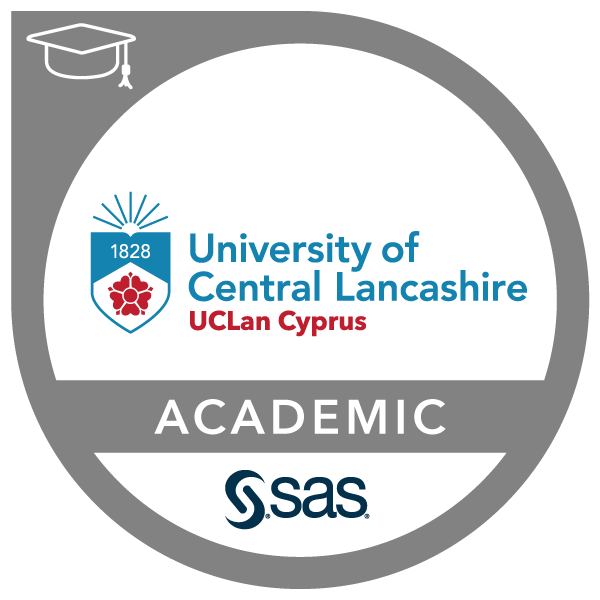
Kalia Athanasiou
BSc Mathematics Alumni
MSc Data Analytics Alumni
“One of the advantages of studying at UCLan Cyprus is the relationships we develop with the faculty. They are always available, extremely helpful, supportive, friendly and prepare us for the challenges of the real world”. I strongly believe that both my BSc and MSc degrees have contributed to significantly enhancing my knowledge and skills but also to my personal growth.”

Christina Christou-Michael, MSc Data Analytics student Chief Data Analyst, Retail Audit, RAI Consultants LTD
“Studying MSc Data Analytics at the School of Sciences at UCLan Cyprus was one of the best decisions I made. The programme offers state-of-the-art curriculum and an outstanding learning experience. The programme helped me develop the skillset necessary to work with new and emerging technologies, thus broadening my employability opportunities. I was amazed with how well the learning material and curriculum was structured to ensure the cultivation of wide knowledge and skills in the area of data analytics, ones that span across all layers of the knowledge discovery stack. Additionally, the practical experience with modern tools and leading commercial software technologies for data analysis and mining as well as the SAS integrated curriculum, provided me with new diverse career options. Other elements which I found instrumental to my learning were the exposure to real-life knowledge and industry expertise, the use of real case studies and datasets within the learning material, and the collaboration with industry experts for the completion of real-life projects. Moving beyond the theoretical aspects of the field and applying knowledge to industry settings was an invaluable experience. Coupled with the unique and industry focused curriculum was an exceptional academic support. The academics delivering the programme were all experts, with years of research and industry experience in their respective fields, offering an enhanced learning perspective away from textbook material and informed by latest research findings and industry trends. Academics were always willing to provide support and guidance whenever necessary.”
 Loucas Eracleous, MSc Data Analytics student
Loucas Eracleous, MSc Data Analytics student
“I am generally open to deal with new challenges; this is why I chose UCLan Cyprus to start my master’s degree in Data Analytics. The course broadened my knowledge and gave the me vital technical skills in machine learning. Additionally, the faculty is very helpful and friendly. They are always supporting us and helping us to understand our strengths and weaknesses. I strongly believe that the knowledge I have gained in MSc in Data Analytics at UCLan Cyprus, will be very valuable for me to find and exploit new opportunities. I am ready to start my career with confidence.”
 Abdulkadir Aliyu, MSc Data Analytics student
Abdulkadir Aliyu, MSc Data Analytics student
“My name is Abdulkadir Aliyu from Nigeria, I am pursuing my master’s degree in Data Analytics at the University Of Central Lancashire, Cyprus. The outstanding services provided by the school has made it very easy for me to quickly adapt to the system in a very short time. The exceptional support from my course leader, lecturers and the department in general made it possible for me to attain the very best in my modules and knowledge as whole, which opens numerous opportunities for me to achieve my goals.”
 Ioanna Ioannou, MSc Data Analytics student
Ioanna Ioannou, MSc Data Analytics student
“The MSc Data Analytics programme was an excellent addition to my educational background. It has helped me develop a variety of new skills, gaining industry-level data analytics knowledge which landed me on several job opportunities in a short period of time. The faculty was always next to me and has put in all the effort to prepare all of us for what is next. The professors were very competent and encouraging, always willing to reply in every question.”

John Johnson Ogbidi, MSc Data Analytics
“Without a doubt, studying MSc Data Analytics at UCLan Cyprus was instrumental in helping me acquire the skills I needed to progress to the international market. The course team was consistently available, offering astute mentorship and guidance. This enabled me to not only achieve academic rigor but also to develop technical skills and the ambition to explore international opportunities. I am deeply grateful for the academic leadership, principles, and insights the team imparted, which will undoubtedly guide my approach and interactions in the future. I am committed to representing the institution with distinction, reflecting the academic excellence we uphold.”

















 Loucas Eracleous, MSc Data Analytics student
Loucas Eracleous, MSc Data Analytics student Abdulkadir Aliyu, MSc Data Analytics student
Abdulkadir Aliyu, MSc Data Analytics student Ioanna Ioannou, MSc Data Analytics student
Ioanna Ioannou, MSc Data Analytics student
